Fleurs du Mal Magazine


Or see the index
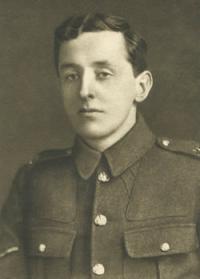
A Lark Above the Trenches 1916
Hushed is the shriek of hurtling shells: and hark!
Somewhere within that bit of soft blue sky-
Grand in his loneliness, his ecstasy,
His lyric wild and free – carols a lark.
I in the trench, he lost in heaven afar,
I dream of Love, its ecstasy he sings;
Doth lure my soul to love till like a star
It flashes into Life: O tireless wings
That beat love’s message into melody –
A song that touches in this place remote
Gladness supreme in its undying note
And stirs to life the soul of memory –
‘Tis strange that while you’re beating into life
Men here below and plunged in sanguine strife!
John William (Will) Streets
(1886 –1916)
A Lark Above the Trenches 1916
• fleursdumal.nl magazine
More in: - Archive Tombeau de la jeunesse, Archive S-T, Natural history, Streets, Will, WAR & PEACE
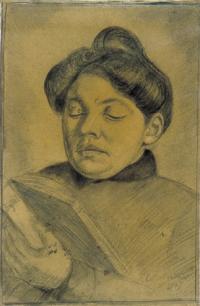
De
verlaten
loopgraaf
Een wond
in d’ aard!
Een geul!
Een spleet!
Deed dat
de mensch,
die denkt,
die weet?
Arm, voet,
been, hoofd,
‘t ligt al
dooreen.
Men zoekt
een mensch!
Er is
er geen!
Slechts bloed!
slechts stank!
Slechts lijk!
Slechts dood!
Op, op!
Meer moord.
Uw land
blijv’ groot!
Agnita Feis
(1881 – 1944)
Uit: Oorlog. Verzen in Staccato (1916).
De verlaten loopgraaf
• fleursdumal.nl magazine
More in: *War Poetry Archive, Agnita Feis, Archive E-F, Doesburg, Theo van, Essays about Van Doesburg, Kok, Mondriaan, Schwitters, Milius & Van Moorsel, Feis, Agnita, Kok, Antony, WAR & PEACE
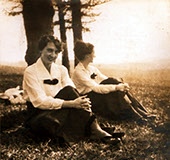
Folded Power
Sorrow can wait,
For there is magic in the calm estate
Of grief; lo, where the dust complies
Wisdom lies.
Sorrow can rest,
Indifferent, with her head upon her breast;
Idle and hushed, guarded from fears;
Content with tears.
Sorrow can bide,
With sealèd lids and hands unoccupied.
Sorrow can fold her latent might,
Dwelling with night.
But Sorrow will rise
From her dream of sombre and hushed eternities.
Lifting a Child, she will softly move
With a mother’s love.
She will softly rise.
Her embrace the dying will recognize,
Lifting them gently through strange delight
To a clearer light.
Gladys Cromwell
(1885-1919)
Folded Power
• fleursdumal.nl magazine
More in: Archive C-D, Cromwell, Gladys, Gladys Cromwell
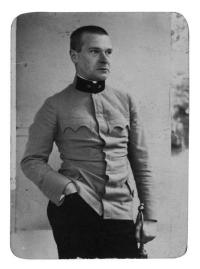
An meine Schwester
Wo du gehst wird Herbst und Abend,
Blaues Wild, das unter Bäumen tönt,
Einsamer Weiher am Abend.
Leise der Flug der Vögel tönt,
Die Schwermut über deinen Augenbogen.
Dein schmales Lächeln tönt.
Gott hat deine Lider verbogen.
Sterne suchen nachts Karfreitagskind
Deinen Stirnenbogen.
Georg Trakl
(1887 – 1914)
An meine Schwester, 1913
• fleursdumal.nl magazine
More in: - Archive Tombeau de la jeunesse, Archive S-T, Trakl, Georg, Trakl, Georg, WAR & PEACE

Design Museum Den Bosch presenteert de eerste grote overzichtstentoonstelling van design van het Derde Rijk. De tentoonstelling Design van het Derde Rijk toont de enorme bijdrage van vormgeving aan de ontwikkeling van de kwaadaardige nazi-ideologie.
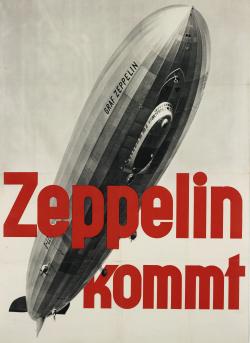 Met de Volkswagen Kever, de Olympische Spelen in 1936, de swastika en de films van Leni Riefenstahl en andere belangrijke stukken uit Nederland en Duitsland. Design van het Derde Rijk: waarom in Design Museum Den Bosch?
Met de Volkswagen Kever, de Olympische Spelen in 1936, de swastika en de films van Leni Riefenstahl en andere belangrijke stukken uit Nederland en Duitsland. Design van het Derde Rijk: waarom in Design Museum Den Bosch?
Musea zijn gewend om de goede kant van cultuur te zien. Juist design wordt vaak gepresenteerd als een bijdrage aan een betere wereld.
De geschiedenis van vormgeving bestaat daarom uit steeds terugkerende onderwerpen die het moreel juiste vertegenwoordigen.
Maar design reflecteert de wereld, met al zijn goede én slechte kanten. In de tentoonstelling Design van het Derde Rijk is de vormgeving een instrument in de handen van het ultieme kwaad.
 De nazi’s waren meesters in het inzetten van vormgeving om hun doel te bereiken; massa’s mensen wisten ze ermee aan hun kant te krijgen en te onderdrukken. Design Museum Den Bosch is een designmuseum nieuwe stijl met een kritische opstelling. Als je volmondig dit nooit weer wilt kunnen zeggen, moet je de moeite nemen te analyseren hoe de processen van beïnvloeding destijds werkten. Dat is wat deze tentoonstelling doet.
De nazi’s waren meesters in het inzetten van vormgeving om hun doel te bereiken; massa’s mensen wisten ze ermee aan hun kant te krijgen en te onderdrukken. Design Museum Den Bosch is een designmuseum nieuwe stijl met een kritische opstelling. Als je volmondig dit nooit weer wilt kunnen zeggen, moet je de moeite nemen te analyseren hoe de processen van beïnvloeding destijds werkten. Dat is wat deze tentoonstelling doet.
Het design van het Derde Rijk was in grondslag tegenstrijdig. De tentoonstelling Design van het Derde Rijk is daarom ingedeeld aan de hand van verschillende tegenstellingen.
Zuiverheid stond centraal, wat betekende dat verschillende bevolkingsgroepen als Joden, homo’s en zigeuners dienden te worden vernietigd. Het nazisme bedacht en steunde op een eigen geschiedenis, maar was tegelijkertijd fanatiek gericht op de toekomst. Het was vervuld van romantiek, maar ook geobsedeerd door moderne technologie.
Naar buiten toe liet het nazisme een verleidelijk beeld zien van voorspoed en zorgeloos vertier, terwijl in 1933 al de eerste concentratiekampen werden opgezet. Samen laten deze paradoxen zien hoe het nazisme binnen twaalf jaar eerst tot een enorme ontwikkeling en vervolgens tot een daverende ineenstorting kwam. En op welke manier design in dat proces een doorslaggevende rol speelde.
De tegenstellingen die het nazisme kenmerken worden getoond aan de hand van een ruime selectie objecten uit Nederlandse en Duitse musea en verzamelingen. Zo zijn er architectuurelementen en meubels te zien uit het Haus der Deutschen Kunst en de Rijkskanselarij.
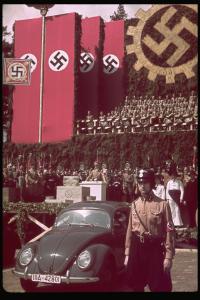 De ontwerpen tonen hoe de nazi’s teruggrepen op de classicistische vormgeving als machtsvertoon en symbool voor een nieuwe Duitse cultuur. De vele tijdschriften die opgenomen zijn in de tentoonstelling geven een beeld van het ver doorgevoerde doelgroepenbeleid van de nazi’s. Van moeders tot soldaten, van jonge meisjes tot internationale bezoekers, iedereen werd op een eigen manier aangesproken. Instructieboeken laten zien hoe precies ieder onderdeel van de beeldvorming rond de nazi’s werd ontworpen. Bij de massabijeenkomsten werd niets aan het toeval over gelaten.
De ontwerpen tonen hoe de nazi’s teruggrepen op de classicistische vormgeving als machtsvertoon en symbool voor een nieuwe Duitse cultuur. De vele tijdschriften die opgenomen zijn in de tentoonstelling geven een beeld van het ver doorgevoerde doelgroepenbeleid van de nazi’s. Van moeders tot soldaten, van jonge meisjes tot internationale bezoekers, iedereen werd op een eigen manier aangesproken. Instructieboeken laten zien hoe precies ieder onderdeel van de beeldvorming rond de nazi’s werd ontworpen. Bij de massabijeenkomsten werd niets aan het toeval over gelaten.
De bruiklenen komen onder andere van het Deutsches Historisches Museum in Berlijn, het Münchner Stadtmuseum, het Haus der Kunst en het Institut für Zeitgeschichte in München, het Eyewitness Museum in Beek en het Nationaal Militair Museum in Soesterberg.
Bij de tentoonstelling is er een uitgebreid publieksprogramma, met activiteiten voor alle doelgroepen.
De tentoonstelling participeert in de herdenking 75 jaar vrijheid.
Design Museum Den Bosch presenteert
Design van het Derde Rijk
7 september 2019 t/m 19 januari 2020
Design Museum Den Bosch – De Mortel 4 – 5211 HV – ‘s-Hertogenbosch
# meer op website design museum: https://designmuseum.nl/
Design Museum Den Bosch:
Design van het Derde Rijk
• fleursdumal.nl magazine
More in: *War Poetry Archive, Art & Literature News, AUDIO, CINEMA, RADIO & TV, Design, Exhibition Archive, Holocaust, PRESS & PUBLISHING, REPRESSION OF WRITERS, JOURNALISTS & ARTISTS
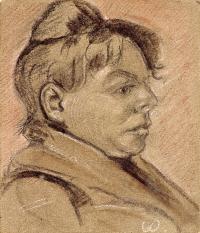
Menschenmateriaal.
Het is
maar bloed.
Het is
maar been.
Is ‘t heusch
maar stof?
Is ‘t stof
alleen?
Men schendt
natuur.
Men schendt
den geest.
Men is
geen mensch.
Men is
geen beest!
Werp maar
den mensch
in ‘t vuur!
Ga voort!
Maar ‘t is
ùw ziel,
die wordt
vermoord!
Agnita Feis
(1881 – 1944)
Uit: Oorlog. Verzen in Staccato (1916).
Menschenmateriaal
• fleursdumal.nl magazine
More in: *War Poetry Archive, Agnita Feis, Antony Kok, Archive E-F, De Stijl, Doesburg, Theo van, Feis, Agnita, Kok, Antony, Theo van Doesburg, Theo van Doesburg (I.K. Bonset), WAR & PEACE
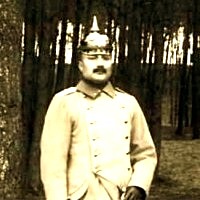
Mondschein
Bleich und müde
Schmieg und weich
Kater duften
Blüten graunen
Wasser schlecken
Winde schluchzen
Schein entblößt die zitzen Brüste
Fühlen stöhnt in meine Hand.
August Stramm
(1874-1915)
Mondschein, 1914
• fleursdumal.nl magazine
More in: *War Poetry Archive, Archive S-T, Expressionism, Stramm, August
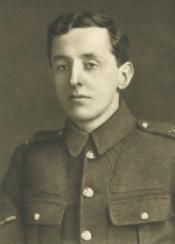
A Soldier’s Funeral
No splendid show of solemn funeral rite,
No stricken mourners following his bier,
No peal of organ reaching thro’ his night,
Is rendered him whom now we bury here.
‘Tis but a soldier stricken in the fight,
A youth who flung his passion into life,
Flung scorn at Death, fought true for Freedom’s might,
Till Death did close his vision in the strife.
No splendid rite is here – yet lay him low,
Ye comrades of his youth he fought beside,
Close where the winds do sigh and wild flowers grow,
Where the sweet brook doth babble by his side.
No splendour, yet we lay him tenderly
To rest, his requiem the artillery.
John William (Will) Streets
(1886 –1916)
A Soldier’s Funeral
• fleursdumal.nl magazine
More in: - Archive Tombeau de la jeunesse, Archive S-T, Streets, Will, WAR & PEACE
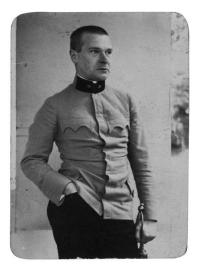
Nähe des Todes
O der Abend, der in die finsteren Dörfer der Kindheit geht.
Der Weiher unter den Weiden
Füllt sich mit den verpesteten Seufzern der Schwermut.
O der Wald, der leise die braunen Augen senkt,
Da aus des Einsamen knöchernen Händen
Der Purpur seiner verzückten Tage hinsinkt.
O die Nähe des Todes. Laß uns beten.
Jn dieser Nacht lösen auf lauen Kissen
Vergilbt von Weihrauch sich der Liebenden schmächtige Glieder.
Georg Trakl
(1887 – 1914)
Nähe des Todes
• fleursdumal.nl magazine
More in: - Archive Tombeau de la jeunesse, Archive S-T, Trakl, Georg, Trakl, Georg, WAR & PEACE
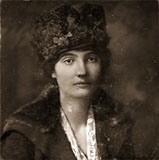
Autumn Communion
This autumn afternoon
My fancy need invent
No untried sacrament.
Man can still commune
With Beauty as of old:
The tree, the wind’s lyre,
The whirling dust, the fire—
In these my faith is told.
Beauty warms us all;
When horizons crimson burn,
We hold heaven’s cup in turn.
The dry leaves gleaming fall,
Crumbs of mystical bread;
My dole of Beauty I break,
Love to my lips I take,
And fear is quieted.
The symbols of old are made new:
I watch the reeds and the rushes,
The spruce trees dip their brushes
In the mountain’s dusky blue;
The sky is deep like a pool;
A fragrance the wind brings over
Is warm like hidden clover,
Though the wind itself is cool.
Across the air, between
The stems and the grey things,
Sunlight a trellis flings.
In quietude I lean:
I hear the lifting zephyr
Soft and shy and wild;
And I feel earth gentle and mild
Like the eyes of a velvet heifer.
Love scatters and love disperses.
Lightly the orchards dance
In a lovely radiance.
Down sloping terraces
They toss their mellow fruits.
The rhythmic wind is sowing,
Softly the floods are flowing
Between the twisted roots.
What Beauty need I own
When the symbol satisfies?
I follow services
Of tree and cloud and stone.
Color floods the world;
I am swayed by sympathy;
Love is a litany
In leaf and cloud unfurled.
Gladys Cromwell
(1885-1919)
Autumn Communion
• fleursdumal.nl magazine
More in: 4SEASONS#Autumn, Archive C-D, Cromwell, Gladys, Gladys Cromwell
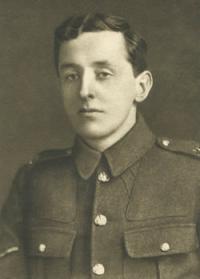
Comrades
Those whom I’ve known, admired, ardently friended
Lie silent there wrapp’d in a soldier’s shroud;
Death broke their dreams, their aspirations ended,
These sanguine youth, noble, brave and proud.
Slowly they bear them ‘neath the dim star light
Unto their rest – the soldiers’ cemetery:
The chaplain chants a low, brief litany;
The nightingale flings rapture on the night.
Back to their Mother Earth this night return
Unnumbered youth along the far-flung line;
But ’tis for these my eyes with feeling burn,
That Memory doth erect a fadeless shrine –
For these I’ve known, admired, ardently friended
Stood by when Death their love, their youth swift ended.
John William (Will) Streets
(1886 –1916)
Comrades
• fleursdumal.nl magazine
More in: - Archive Tombeau de la jeunesse, Archive S-T, Streets, Will, WAR & PEACE
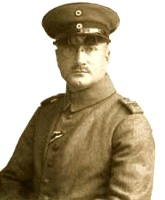
Schwermut
Schreiten Streben
Leben sehnt
Schauern Stehen
Blicke suchen
Sterben wächst
Das Kommen
Schreit!
Tief
Stummen
Wir.
August Stramm
(1874-1915)
Schwermut, 1914
• fleursdumal.nl magazine
More in: *War Poetry Archive, Archive S-T, Expressionism, Stramm, August
Thank you for reading Fleurs du Mal - magazine for art & literature